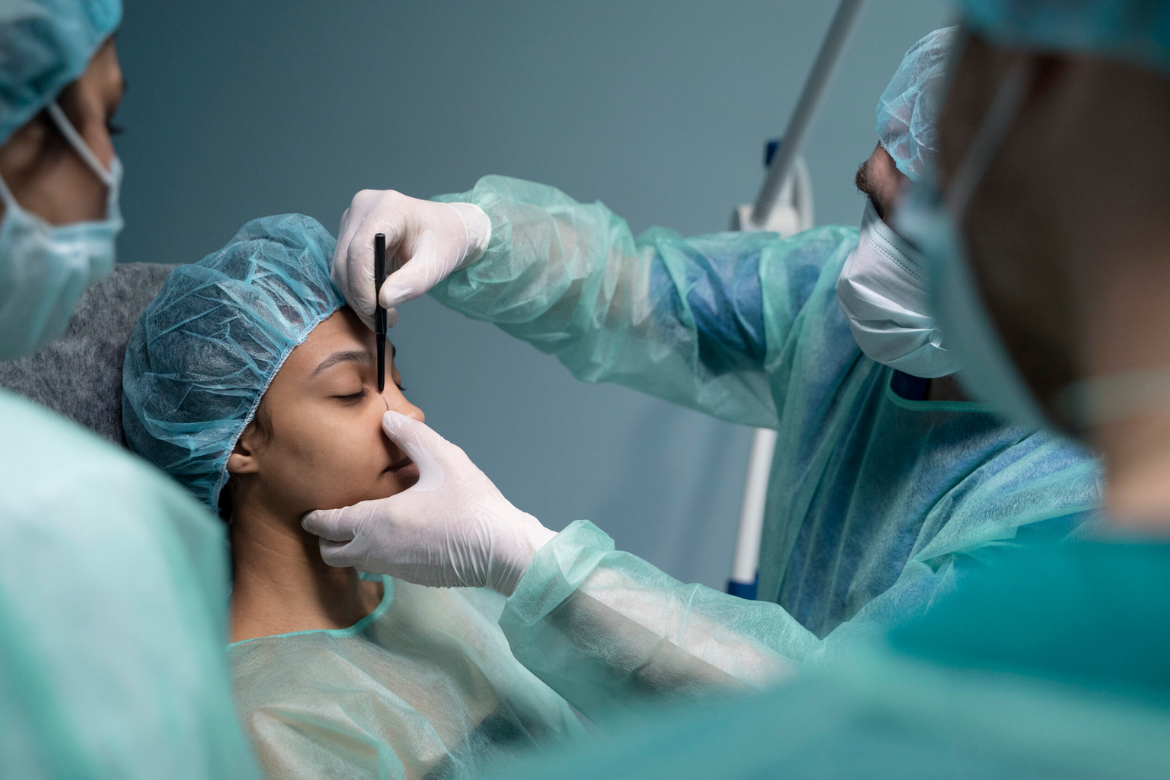
Oculoplastics refers to a series of surgeries around the eyes. Oculoplastic surgery can be understood as surgery that is done around the eyes. Surgeries are done to correct a medical problem or for cosmetic procedures. They are usually performed by ophthalmologists who have special training in plastic or reconstructive surgery. In rare instances, they might be performed by doctors who specialise in head and neck surgery.
Conditions Treated by Oculoplastic Surgery:
Oculoplastic surgery usually deals with a number of surgeries around the eyes and it involves procedures treating medical complications and cosmetic procedures. They include,
- Droopy upper eyelids, known as ptosis.
- Eyelids that turn inward, are known as entropion, and eyes that turn outward, are known as ectropion.
- Eye problems are caused by thyroid disease, like Graves disease.
- Skin cancers.
- Growths in or around the eyes.
- Weakness around the eyes or eyelids caused by Bell palsy.
- Tear duct problems.
- Injuries in the eye or eye area.
- Birth defects in the eyes of the orbit.
Before Your Surgery:
Your doctor might recommend you go through some preemptive surgery preparation before they operate on you and after the procedure is done, this might involve:
- Stop the blood thinners. Your surgeon will give you a list of these medicines and you should avoid them until surgery.
- Check with your regular healthcare provider to have some routine tests to make sure it is safe for you to have surgery.
- To aid with healing, you might be advised to stop smoking 2 to 3 weeks before and after surgery.
- Arranging someone to drive you back home after surgery.
Types of Oculoplastic Surgery
Cosmetic Surgery Procedures:
This usually involves minor cosmetic procedures that are done around the eyes, such as,
This usually involves minor cosmetic procedures that are done around the eyes, such as,
- Blepharoplasty. This is usually done to tighten the skin around the upper and lower eyelids.
- Eyebrow and forehead lift,
- Midface lift
- Botox
- Facelift
Medical eye condition surgery procedures:
Your surgeon might also treat some medical eye conditions through surgery that falls under oculoplastics. The most common conditions treated under oculoplastic surgery include,
Your surgeon might also treat some medical eye conditions through surgery that falls under oculoplastics. The most common conditions treated under oculoplastic surgery include,
- Ptosis
- Entropion
- Ectropion
- Excision or biopsy of cysts, moles, and lesions found around the eyelids.
- Eyelid tumour removal, if you’re affected by skin cancer
- Tear duct surgery refers to surgery done to or around your tear ducts.
- Eye removal surgeries involve complete removal or removing part of your eyes to treat medical conditions.
- Orbital reconstruction, such as artificial eyes or orbital decompression for Grave’s disease.
Cosmetic Surgery Procedures:
This usually involves minor cosmetic procedures that are done around the eyes, such as,
This usually involves minor cosmetic procedures that are done around the eyes, such as,
- Blepharoplasty. This is usually done to tighten the skin around the upper and lower eyelids.
- Eyebrow and forehead lift,
- Midface lift
- Botox
- Facelift
Medical eye condition surgery procedures:
Your surgeon might also treat some medical eye conditions through surgery that falls under oculoplastics. The most common conditions treated under oculoplastic surgery include,
Your surgeon might also treat some medical eye conditions through surgery that falls under oculoplastics. The most common conditions treated under oculoplastic surgery include,
- Ptosis
- Entropion
- Ectropion
- Excision or biopsy of cysts, moles, and lesions found around the eyelids.
- Eyelid tumour removal, if you’re affected by skin cancer
- Tear duct surgery refers to surgery done to or around your tear ducts.
- Eye removal surgeries involve complete removal or removing part of your eyes to treat medical conditions.
- Orbital reconstruction, such as artificial eyes or orbital decompression for Grave’s disease.
Recovering After Surgery:
After surgery, to reach full recovery through a smooth recovery process, you should take certain measures. They include,
- Get enough rest
- Avoid straining your eyes
- Protect your eyes from the sun
- Stop smoking
- Avoid alcohol
- Sleep in a comfortable position
- If there is swelling, place cold or ice packs around the swelled area.
- Make routine appointments with your surgeon to check the state of your recovery.
When to Call the Doctor:
Contact your surgeon or physician straight away if,
- The pain does not go away after taking pain relievers.
- Signs of infection, such as swelling, redness or fluid draining from your eyes keep persisting.
- Your incision is not healing or is starting to separate.
- Your vision gets worse.
Oculoplastics refers to a series of surgeries around the eyes. Oculoplastic surgery can be understood as surgery that is done around the eyes. Surgeries are done to correct a medical problem or for cosmetic procedures. They are usually performed by ophthalmologists who have special training in plastic or reconstructive surgery. In rare instances, they might be performed by doctors who specialise in head and neck surgery.

